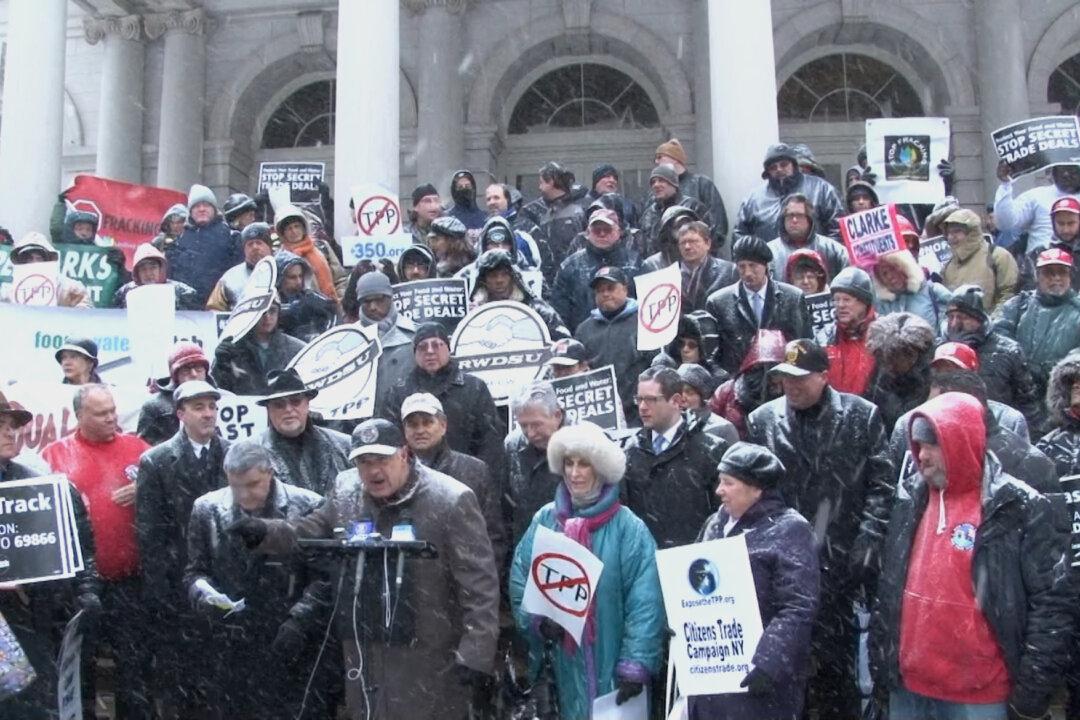NEW YORK—Despite subfreezing temperatures and heavy snowfall Tuesday, New York Congress members, unions, and environmental groups, huddled outside City Hall to call attention to some fast track legislation proposed in the Senate.
The legislation would give the president the ability to negotiate the terms of the Trans-Pacific Partnership agreement (TPP) without Congress being able to discuss or amend any part of it.
“And because of fast-track legislation it will not provide adequate transparency, accountability or oversight. It fails to protect American workers and American jobs,” said Mario Cilento, president of the New York State American Federation of Labor Congress and Industrial Organizations (AFL-CIO).
The agreement, which is similar to the North American Free Trade Agreement (NAFTA), is meant to decrease trade barriers and allow for a freer flow of goods and services across borders.
This is good for companies seeking access to previously protected markets. But it is bad news for small businesses that will not be protected against international competition.
Participating countries include the United States, Australia, Brunei, Canada, Chile, Japan, Malaysia, Mexico, New Zealand, Peru, Singapore, and Vietnam.
At the end of 2009 President Barack Obama announced his intention to enter the partnership to “boost U.S. economic growth and support the creation and retention of high-quality American jobs by increasing exports in a region that includes some of the world’s most robust economies.”
Export or Create Jobs
Opponents of the agreement worry that it will export jobs, not create them.
“What was a real result of NAFTA? For example, American workers saw a net loss of 700,000 jobs. New York lost 46,000 jobs in just the first seven years of NAFTA,” said Rep. Nydia Velazquez, who opposed NAFTA from its inception.
Secrecy
One of the biggest fears opponents have is the manner in which the agreement is taking form.
The U.S. Trade Representative website says it is consulting “with stakeholders in American industry, agriculture, and other sectors, and with labor and environment advisers” on the specifics of the TPP agreements.
However, this process has not been open to the public, and even members of Congress are only allowed to see select portions of the documents. It was because of WikiLeaks that the public knows the specifics of the agreement.
Environmental and Labor Laws
Another concern of opponents to the TPP agreement is the ability of companies to fight local laws in an international tribunal court directly, with no set standards on human rights or environmental protection.
“The TPP could undermine longstanding efforts to ban fracking, label genetically engineered food, and support local agriculture,” warned a New York-based organizer with Food and Water Watch.
Congress
Sen. Max Baucus (D-Mont.) introduced the legislation into the Senate earlier this month. Asked what the general mood in Congress is toward this bill, Sen. Jose Serrano said, “We deal with a thousand issues a day … as this becomes more and more of an issue, you’re going to see more and more members [who oppose it].”
Last year over 150 representatives signed a letter to Obama saying they would not support fast-track legislation that would “usurp Congress’s authority over trade matters.”





